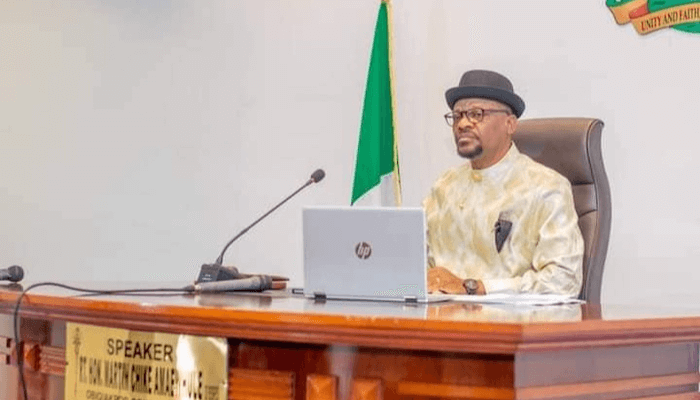Rivers Assembly is not rubber-stamp legislature – Amaewhule
… Speaker harps on tripod function of legislature
The Rivers State House of Assembly, which was at the center of the crisis that eventually led to the declaration of a State of Emergency on the state by President Bola Tinubu, has been described as independent and conscious of its constitutional role as one of the three arms of government.
Martin Amaewhule, Speaker of the Rivers State House of Assembly, made this known on Tuesday October 21, 2025, while speaking at the maiden public engagement programme, with the theme ‘Advancing Politics and Legislature,’ organised by the Centre for Politics, University of Port Harcourt.
Martins Wachukwu, Special Assistant on Media to the Speaker, Rivers State House of Assembly, in a release, said in a lecture on the role of the legislature in a democratic system, Amaewhule described the legislature as the symbol and heartbeat of democracy.
Read also: Supreme Court reserves judgment in PDP’s suit challenging Rivers emergency rule
He said, “The legislature is the symbol of democracy. It will go down in history that during the political crisis in Rivers State, the House of Assembly under my leadership upheld the sanctity of democracy and defended the rule of law.”
The Speaker, with reference to the 1999 Constitution of the Federal Republic of Nigeria (as amended), explained the constitutional provisions regarding elections and continuity in governance during extraordinary situations.
He noted that the Constitution empowers those in authority — including the President and members of the National Assembly — to remain in office where elections cannot be conducted due to instability or national emergencies, until such elections are held.
“Go to the 1999 Constitution as amended; it is clear that if, for any reason, the Independent National Electoral Commission (INEC) cannot conduct elections due to instability or impossibility, those in authority shall continue until elections are conducted. That is the position of the law,” the Speaker said.
Drawing from judicial precedent, Amaewhule cited the recent Supreme Court judgment, which affirmed that in the absence of elections, duly elected officials at the local government level could continue in office until new elections are conducted — a position consistent with the constitutional principle of governance continuity.
“The Supreme Court has settled this matter. There is now a judicial precedent confirming that, in the absence of elections, those duly elected can continue in office until new elections are held. This reinforces the stability and continuity of governance,” he said.
The Speaker explained the three cardinal functions of the legislature — lawmaking, oversight, and representation; noting that these pillars are the foundation on which every democratic society stands.
Amaewhule described lawmaking as the foremost duty of the legislature, which provides the legal framework for governance and ensures the peace, order, and good governance of the state.
He stressed the importance of the Assembly’s oversight function, which he said is the mechanism through which the legislature holds the executive accountable, ensuring transparency, fiscal discipline, and efficiency in public administration.
Read also: Tompolo’s 10bn security support donation rings bell in Rivers
‘Representation,’ Amaewhule said, connects the people to government, ensuring that their voices, needs, and aspirations are reflected in policies and laws.
The Speaker commended the Centre for Politics, University of Port Harcourt, for initiating the public engagement series, describing it as a bridge between academic research and real-world governance. He encouraged students to actively participate in political discourse and legislative studies to deepen democratic understanding in Nigeria.
In attendance at the event were Georgewill Owunari, Vice-Chancellor of the University of Port Harcourt, prominent politician, Tonye Princewill, senior academics, members of the Rivers State House of Assembly, and representatives of civil society organisations.

